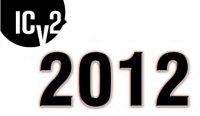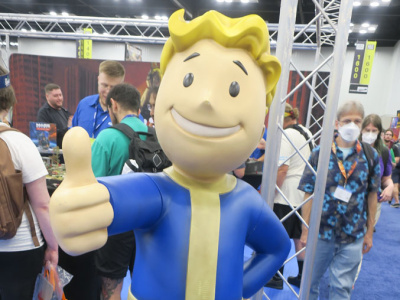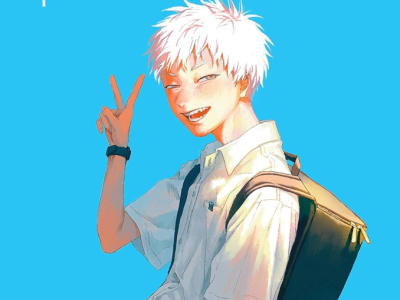
This is our list of the most important events in the comics business in 2012. We based that ranking on the impact on the economics of the business. We don’t do year-end lists every year, and when we do, we don’t always make the same kind of list, so let us know what your Top Five list is and why, and what you think of this kind of year end list.
1. A Great Year for Comic Stores, and for Digital
It’s been a while since we’ve seen a year like this in comic stores: through November, dollars were up 14.6% vs. the year ago period in the channel, with nearly identical growth in both comics and graphic novels (see "Comics Down in November, But Up"). When the final dollars are tallied, sales in the comic store channel are going to be the best in many years, certainly the best of the century.
And perhaps most remarkably, these dramatic increases are happening at the same time that digital comic sales are exploding, growing at a 3X rate through mid-year, and an anticipated strong over-all growth rate for the year despite tougher comps in September through December (see "ICv2's Comic Market Size Analysis for 2012").
This hasn’t been the case with other media, where digital growth has come at the expense of print sales. But then, we’ve been arguing for years that print comics can grow at the same time as digital, as the long-term distribution constraints on comic sales are lifted (see "Why Digital Comics Are Different").
2. The Walking Dead Biggest in TV
2. The Walking Dead Biggest in TV
This is the first time we’ve seen a comic-based TV show as the #1 prime time show in the all-important 18-49 demo (see "'TWD' the Top Fall Series"), and the effects couldn’t be more profound. The Walking Dead is topping the graphic novel charts in both comic stores (see "Top 300 Graphic Novels--November 2012") and bookstores (see "Nothing Can Stop 'The Walking Dead'"), and blowing the doors off in digital as well (see "Digital 25-30% of 'The Walking Dead'"). It’s also driving game, toy, videogame, and other product sales. And perhaps most significantly, it’s not a Big Two title, it’s from Image and owned by creator Robert Kirkman.
3. Creators’ Rights Back to the Fore
Part of this new turmoil has been brewing for years, as DC battles the Siegel and Shuster heirs over Superman rights (see "New Ruling, Appeal in Superman Case"), and Marvel battles Kirby’s heirs over his creations (see "Marvel Gets Kirby Blowback"). It gained steam this year with DC’s decision to publish Watchmen prequel comics against the wishes of writer Alan Moore (see "DC Announces ‘Watchmen’ Prequel"). Marvel’s pursuit of Gary Friedrich over his use of Ghost Rider, a character he created (see "'Ghost Rider' Creator Owes Marvel 17 Grand"), added fuel. And then creators started leaving the Big Two over the issues, including Chris Roberson (see "Roberson Reaction Wide and Deep"), Roger Langridge (see "Langridge Details Reasons"), and Greg Rucka (see "More Creator Discontent: Greg Rucka Slams the Big Two"). High profile publications noted the disputes (see "WSJ Trashes Big Two").
This all happened in the context of the multi-media success of The Walking Dead, a creator-owned book, a creative renaissance at Image, and the associated success of Image titles such as Saga. There seems to be as much happening on creators’ rights as at any time since the creation of Image in the early 90s. It’s unclear where it will lead, but the size of the phenomenon ensures that it will have at least some legs. And the new digital distribution channels are also give creators new ways to reach the market if they choose to eschew Big Two titles.
4. Top Two Movies of 2012 Based on Comics
Just as a comic property is attracting huge TV audiences, comic-based properties were also tops in theaters. The Avengers was the top movie of the year and the #3 movie all time, with over $1.5 billion in box office grosses worldwide. And The Dark Knight Rises was the #2 movie of the year and #7 all time, with over $1 billion worldwide. For good measure, The Amazing Spider-Man was the #6 movie of the year.
While it’s happened before (in 2008, The Dark Knight Was #1 and Iron Man was #2), the total of the two films was smaller, with neither reaching the heights that The Avengers did in 2012. The back-to-back hits confirmed the importance of comics to Hollywood and over-all pop culture, and created more customers for comics in both print and digital.
5. Disney Buys Lucasfilm
This deal was important because it puts together Marvel, one of the Big Two comic publishers, and Star Wars, the most important property in comics (although it originated in film) not previously owned by a comic publisher, under one corporate umbrella. It’s looking more and more like that means Marvel is going to be publishing Star Wars comics, ending a decades-long relationship (see "No More Dark Horse 'Star Wars'?").
6. Variants Hit New Heights
The use of variants to stimulate sales hit new heights this year (see "Variant Covers Jump the Shark?"), in two major forms: all-you-can-eat cover variants, which can be ordered in any quantity to meet anticipated demand; and incentive variants, available in limited quantities only if certain ordering thresholds are met. DC has called the level of use an "11" on a ten-point scale ("DC Execs on Variants"), and vowed to cut back (see "DC to Cut Variants").
7. Original Art Prices Hit New Highs
The art for the cover to Amazing Spider-Man #328 by Todd McFarlane sold for over $650,000 (see "McFarlane Cover Brings Over $650,000"); and from a broader market, the art for a Tintin cover sold for $1.6 million (see "'Tintin' Cover Sold for $1.6 Million").
8. Marvel NOW! Launches
Marvel’s refresh is garnering big sales for the first issues (see "Marvel NOW! Titles Dominate November Sales"), and although the impact is not as great as DC’s "New 52," at least not yet, it looks to be bigger than a cross-over event.
9. Comic Kickstarter Tops $1.25 Million
Rich Burlew raised $1.25 million for collections of the Webcomic Order of the Stick (see "1.25 Million for Graphic Novels"), a staggering total that demonstrated both the size and passion of the Webcomics audience, and the potential for creators to fund comic-based products using the crowdfunding platform.
10. Karen Berger Leaves Vertigo. Berger’s impact at Vertigo, created in part in response to the winds of change surrounding the last great creators’ rights turmoil, was profound, and although the changes at Vertigo are more incremental than a simple departure, Berger leaving marks the end of an era (see "Karen Berger Leaving Vertigo"), and the beginning of a new one (see "Kanalz Gets Vertigo").
3. Creators’ Rights Back to the Fore
Part of this new turmoil has been brewing for years, as DC battles the Siegel and Shuster heirs over Superman rights (see "New Ruling, Appeal in Superman Case"), and Marvel battles Kirby’s heirs over his creations (see "Marvel Gets Kirby Blowback"). It gained steam this year with DC’s decision to publish Watchmen prequel comics against the wishes of writer Alan Moore (see "DC Announces ‘Watchmen’ Prequel"). Marvel’s pursuit of Gary Friedrich over his use of Ghost Rider, a character he created (see "'Ghost Rider' Creator Owes Marvel 17 Grand"), added fuel. And then creators started leaving the Big Two over the issues, including Chris Roberson (see "Roberson Reaction Wide and Deep"), Roger Langridge (see "Langridge Details Reasons"), and Greg Rucka (see "More Creator Discontent: Greg Rucka Slams the Big Two"). High profile publications noted the disputes (see "WSJ Trashes Big Two").
This all happened in the context of the multi-media success of The Walking Dead, a creator-owned book, a creative renaissance at Image, and the associated success of Image titles such as Saga. There seems to be as much happening on creators’ rights as at any time since the creation of Image in the early 90s. It’s unclear where it will lead, but the size of the phenomenon ensures that it will have at least some legs. And the new digital distribution channels are also give creators new ways to reach the market if they choose to eschew Big Two titles.
4. Top Two Movies of 2012 Based on Comics
Just as a comic property is attracting huge TV audiences, comic-based properties were also tops in theaters. The Avengers was the top movie of the year and the #3 movie all time, with over $1.5 billion in box office grosses worldwide. And The Dark Knight Rises was the #2 movie of the year and #7 all time, with over $1 billion worldwide. For good measure, The Amazing Spider-Man was the #6 movie of the year.
While it’s happened before (in 2008, The Dark Knight Was #1 and Iron Man was #2), the total of the two films was smaller, with neither reaching the heights that The Avengers did in 2012. The back-to-back hits confirmed the importance of comics to Hollywood and over-all pop culture, and created more customers for comics in both print and digital.
5. Disney Buys Lucasfilm
This deal was important because it puts together Marvel, one of the Big Two comic publishers, and Star Wars, the most important property in comics (although it originated in film) not previously owned by a comic publisher, under one corporate umbrella. It’s looking more and more like that means Marvel is going to be publishing Star Wars comics, ending a decades-long relationship (see "No More Dark Horse 'Star Wars'?").
6. Variants Hit New Heights
The use of variants to stimulate sales hit new heights this year (see "Variant Covers Jump the Shark?"), in two major forms: all-you-can-eat cover variants, which can be ordered in any quantity to meet anticipated demand; and incentive variants, available in limited quantities only if certain ordering thresholds are met. DC has called the level of use an "11" on a ten-point scale ("DC Execs on Variants"), and vowed to cut back (see "DC to Cut Variants").
7. Original Art Prices Hit New Highs
The art for the cover to Amazing Spider-Man #328 by Todd McFarlane sold for over $650,000 (see "McFarlane Cover Brings Over $650,000"); and from a broader market, the art for a Tintin cover sold for $1.6 million (see "'Tintin' Cover Sold for $1.6 Million").
8. Marvel NOW! Launches
Marvel’s refresh is garnering big sales for the first issues (see "Marvel NOW! Titles Dominate November Sales"), and although the impact is not as great as DC’s "New 52," at least not yet, it looks to be bigger than a cross-over event.
9. Comic Kickstarter Tops $1.25 Million
Rich Burlew raised $1.25 million for collections of the Webcomic Order of the Stick (see "1.25 Million for Graphic Novels"), a staggering total that demonstrated both the size and passion of the Webcomics audience, and the potential for creators to fund comic-based products using the crowdfunding platform.
10. Karen Berger Leaves Vertigo. Berger’s impact at Vertigo, created in part in response to the winds of change surrounding the last great creators’ rights turmoil, was profound, and although the changes at Vertigo are more incremental than a simple departure, Berger leaving marks the end of an era (see "Karen Berger Leaving Vertigo"), and the beginning of a new one (see "Kanalz Gets Vertigo").







